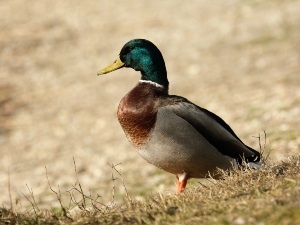
Food and water are all that should be going into your duck’s mouth and nothing should be coming out of your duck’s mouth, but this isn’t always the case.
Yellow mucus will sometimes come out of the mouths of ducks. You may be wondering why this is happening. This article looks into it.
Table of Contents
Yellow mucus coming from ducks mouth:
Anything out of the ordinary, with regards to your duck, should concern you as a duck keeper. Mucus, especially yellow mucus, coming from your duck’s mouth is concerning.
Here is why there is yellow mucus coming out of your ducks mouth:
Respiratory infection:
Respiratory infections will not only affect humans, they will affect a variety of animals as well, ducks included.
A variety of respiratory infections exist and these can be caused by viruses, bacteria, fungi, and parasites.
One of the symptoms of the respiratory infection that your bird is suffering from may be slime or mucus produced in excess coming from your bird’s mouth.
Other signs of a respiratory infection in your bird include sneezing, wheezing, lethargy, fluffing of feathers, a voice change, difficulty breathing, the bird keeping its eyes closed, and nasal discharge to name a few.
The mucus that your bird initially produces will be clear, but if the bird has been sick for a while it will turn yellow.
The yellowness comes from the dead white blood cells in the mucus that rushed to battle the infection.
They are removed by the bird’s body once they have done their job and are dead. This yellow mucus usually indicates that the bird is fighting a bacterial infection, but this needs to be confirmed by your vet.
What to do:
If you can quickly take your bird to the vet for an examination because there are so many respiratory infections that your bird may be suffering from.
It isn’t recommended that you try to diagnose the bird yourself, this may only take up time that your bird cannot afford to lose.
If you can’t immediately get the bird to the vet you’d need to isolate the bird to keep it from infecting other birds. You can keep the bird in a small enclosed space like a pet carrier or a dog cage.
Leave food and water in the enclosure and leave soft clean bedding in the enclosure, this will keep the bird comfortable.
Your vet will run tests on your duck as soon as the bird arrives for its appointment.
Tests that your vet may do include blood sampling to get a comprehensive blood count, blood serology testing, the vet will take samples of the inside of the bird’s mouth or nasal cavity and the vet may also do x-rays on the bird or CT scans of the bird.
It is likely that your vet will prescribe some antibiotics for your bird if the bird does have a bacterial infection.
The vet will prescribe the correct antibiotics for your bird’s condition as well as the correct dosage instructions.
If you think that your bird has a bacterial infection it is not recommended that you give the bird antibiotics before going to the vet.
This is not recommended as the wrong type of antibiotics can easily be given and your bird may be given medications at the incorrect dosages.
If you enjoyed this article then you may also be interested in other bird related articles. Here are some articles that you may be interested in: Duckling Foaming At The Mouth, Duck Not Cleaning Itself, Duck Has Mucus Coming Out Of Mouth Why Does My Duck Sound Congested?, Duck Dragging Bottom

